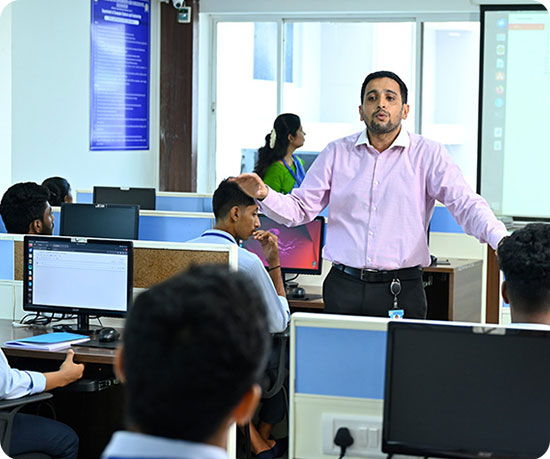PROGRAMS
B.E. in Computer Science & Engineering (Artificial Intelligence & Machine Learning)
A J Institute of Engineering and Technology, a unit of Laxmi Memorial Education Trust, Mangalore, introduced an undergraduate engineering program in Computer Science & Engineering specializing in Artificial Intelligence & Machine Learning, with an allotted intake of 60 students. The Department of Artificial Intelligence & Machine Learning (AL&ML) stands as a pioneer in cutting-edge technology, leading innovation and driving advancements in artificial intelligence (AI) and machine learning (ML). Our department is dedicated to pushing the boundaries of intelligent systems, predictive analytics, and automated decision-making. Our team of highly qualified, experienced, and dedicated faculty members collaborates tirelessly to harness the potential of AI and ML across various industries and applications. From healthcare and finance to manufacturing and beyond, we utilize state-of-the-art algorithms and methodologies to uncover insights, streamline processes, and unlock the latent value within data.
Central to our mission is the unwavering pursuit of excellence in both theoretical knowledge and practical application. Through rigorous research, experimentation, and real-world implementation, we endeavour to develop robust AI and ML solutions that not only meet but surpass the evolving demands of our stakeholders. Energized by a collective passion for exploration and a commitment to excellence, the Department of Artificial Intelligence & Machine Learning is positioned to shape the future of technology, revolutionizing the way we live, work, and interact with the world around us.

Level : Under graduation
Duration : 4 years
Eligibility :
Pass in the 2nd PUC/12th/Equivalent Exam
PROGRAM OUTCOMES (POs)
- Engineering knowledge : Apply the knowledge of mathematics, science, engineering fundamentals and an engineering specialization to the solution of complex engineering problems.
- Problem Analysis : Identify, formulate, review research literature, and analyse complex engineering problems reaching substantiated conclusions using first principles of mathematics, natural science and engineering sciences.
- Design/development of solutions : Design solutions for complex engineering problems and design system components or processes that meet the specified needs with appropriate consideration for the public health and safety, and the cultural, societal and environmental considerations.
- Conduct investigations of complex problems : Use research based knowledge and research methods including design of experiments, analysis and interpretation of data, and synthesis of the information to provide valid conclusions.
- Modern tool usage : Create, select and apply appropriate techniques, resources and modern engineering and IT tools including prediction and modelling to complex engineering activities with an understanding of the limitations.
- The engineer and society : Apply reasoning informed by the contextual knowledge to assess societal, health, safety, legal and cultural issues and the consequent responsibilities relevant to the professional engineering practice.
- Environment sustainability : Understand the impact of the professional engineering solutions in the societal and environmental contexts, and demonstrate the knowledge of, and need for sustainable development.
- Ethics : Apply ethical principles and commit to professional ethics and responsibilities and norms of the engineering practice.
- Individual and team work : Function effectively as an individual and as a member or leader in diverse teams, and in multidisciplinary settings.
- Communication : Communicate effectively on complex engineering activities with the engineering community and with society at large, such as, being able to comprehend and write effective reports and design documentation, make effective presentations, and give and receive clear instructions.
- Project management and finance : Demonstrate knowledge and understanding of the engineering and management principles and apply these to ones own work, as a member and leader in a team, to manage projects and in multidisciplinary environments.
- Lifelong learning : Recognize the need for, and have the preparation and ability to engage in independent and lifelong learning in the broader context of technological change.
PROGRAM SPECIFIC OUTCOMES (PSOs)
- Develop & designing advanced AI and ML algorithms, focusing on deep learning, NLP, computer vision, and reinforcement learning systems.
- Apply practical experience with cutting-edge tools and platforms for data handling and deploying AI/ML solutions to solve real-world problems.
Graduates of CSE(Artificial Intelligence & Machine Learning program) will be able to
PROGRAM EDUCATION OBJECTIVES (PEOs)
- To apply artificial intelligence and machine learning (AIML) concepts, leveraging deep expertise in computer science and engineering, to address social issues and contribute to national development programs.
- To Foster a research and innovation culture by moulding them into skilled developers and innovative thinkers, who can push the boundaries of AIML applications and technology.
- Establish collaborations between Industry and Academics to give access to state-of-the-art technology and practical professional problems, fostering their integrity and capacity to succeed in a variety of professional settings.
Graduates of CSE(Artificial Intelligence & Machine Learning program) will be able to
